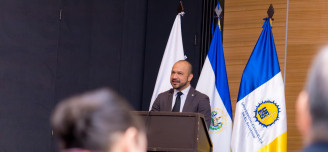Leave No One Behind: G20 Interfaith Forum and PaRD Annual Forum
Board of Foundation member Rudolf von Sinner represented Globethics at the G20 Interfaith Forum and PaRD Annual Forum on Religion and Sustainable Development: “Leave No One Behind: the Well-being of the Planet and its People”, Brasília, 19-22 August 2024. Globethics is a member of the International Partnership on Religion and Sustainable Development (PaRD), which seeks to bring together Faith-Based Organisations, Civil Society Organisations and governments. The Brazilian government was notably present through the Ministries of Human Rights, the Environment, and Education.
Amid all the ambiguity of religious positions and actions in society today, the positive and effective contribution of many religious communities and Faith-Based Organisations towards the common good, the uplifting of the poor, and the protection of the environment is being valued. The presence of indigenous communities and (Brazilian) religions of African descent was especially strong and outspoken in an event that convened around 450 participants, including development experts, activists, religious leaders, lawyers, politicians and academics. The contribution of the Interfaith Forum to the 2024 G20 Meeting at Rio de Janeiro focuses on food security, the protection of the environment, the construction of peace, debt relief, and human trafficking and modern slavery.

Von Sinner spoke in a panel on “Religious Action Against Corruption”. Globethics has a longstanding engagement in this, especially through its founder and president, Professor Christoph Stückelberger. The organisation has been involved in a number of initiatives to reduce corruption within religions and religious organisations, especially in Africa and Asia.
The definition of corruption as used by Transparency International is “the abuse of entrusted power for private gain”. It implies a lack of legitimacy, transparency, honesty and accountability, resulting in a tremendous drain of resources from those who most need them. It also destroys trust, which is such an important ingredient of any society.
No religion is in favour of corruption, indeed many are explicitly against it. They leave no doubt that resources are to be used responsibly to serve ethically sound purposes, to foster life and justice and the wellbeing of all, and that such stewardship is good.
Given this doctrinal evidence, one would expect that the more religious a society, the less corrupt it is. Empirical research does not confirm this expectation. The more religious a society, the more corrupt it is. The issue is that there may be lower accountability, more collectivism and even collusion in religious communities, allowing for corruption to happen and go unpunished. There might be an excess of trust in religious leaders. Where there is effective control and wide participation in decision-making, corruption diminishes. Where women exercise leadership and are empowered in their role in a religious community, there is also less corruption.
Interpersonal and institutional trust is very important, but it should never be blind, von Sinner argued. Trust should be fostered precisely by transparency, accountability and responsible leadership. The contribution of religions to society in this regard will be as good as their ability to keep their own house in order. The challenge is not only to prevent bad practices, but to promote good practices, which depend on people, their values and virtues. Overcoming corruption also needs a legal, moral, political, economic and social environment that ensures people do not have to use corruption as a means for pure survival, or to get what is due to them.


